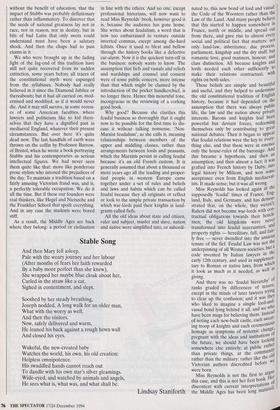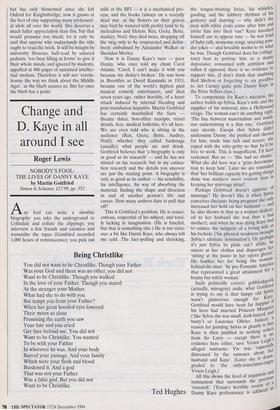A corking good book
Eric Christiansen
FIEFS AND VASSALS: THE MEDIAEVAL EXPERIENCE REINTERPRETED by Susan Reynolds OUP, £20, pp.544 Why should anyone want to study the Middle Ages? This is not easy to answer, except in vague and presumptuous terms. At the very least, it's still a living, in a small way, in some universities. But there was a time, in England, when things were differ- ent; when the Middle Ages seemed so important that bits of them were force-fed to hundreds and possibly thousands of undergraduates as a peculiarly nourishing part of the history course. That was between about 1870 and 1970, during what now seems like a strange educational episode, but was accepted as perfectly natural then.
The theory behind it was expressed by Bishop Stubbs of Oxford, the impresario of Modern History in that university. It was not that the Middle Ages were intrinsically interesting, but that certain developments had occurred at that time which were of immediate consequence to every man and woman born alive, both Liberal and Con- servative. English Liberty (much superior to the French article, cooked up in a nasty Revolution); the English Parliament: the `National Church% the Common Law; the fundamentals that made up the Constitu- tion, and Trial by Jury as well: all were cre- ations of the Middle Ages, not of Antiquity or Modernity, and creations tenderly pre- served in this country when carelessly thrown aside in others.
And so it was good that puzzled oarsmen in flannel dressing-gowns should bend the brow over the text of Magna Carta, the Assize of Novel Disseisin, and the Statute of Quia Emptores, and disturb the misty quadrangles with their groans, and scribble the margins of Stubbs' Select Charters with caricatures of dons, chorus-girls and Simon de Montfort.
Perhaps it was all a mistake, but it was not a harmful one. At least, the conse- quences were not obviously harmful; Englishmen of that period had such a fat- headed notion of their own importance,
without the benefit of education, that the impact of Stubbs was probably deflationary rather than inflammatory. To discover that the seeds of national greatness lay not in race, nor in reason, nor in destiny, but in bits of bad Latin that only swots could understand must have been a salutary shock. And then the chaps had to pass exams in it.
We who were brought up in the fading light of the fag-end of this tradition have still not quite recovered from its sudden extinction, some years before all traces of the constitutional myth were expunged from the syllabuses. Nobody had really believed in it since the Diamond Jubilee or thereabouts; but it had all carried on, mod- ernised and modified, as if it would never die. And it may still survive, in some recess- es of some American faculties, where lawyers and politicians like to kid them- selves that they have a dignified past in mediaeval England, whatever their present circumstances. But over here it's quite dead now. The last handfuls of earth were thrown on the coffin by Professor Burrow, of Bristol, when he wrote a book portraying Stubbs and his contemporaries as serious intellectual figures. We had never seen them quite like that: more like ponderous prose stylists who intoned the prejudices of the day. To maintain a tradition based on a fairly amusing Victorian fraud was, and is, a perfectly tolerable occupation. We do it all the time. But if these our founders were real thinkers, like Hegel and Nietszche and the Frankfurt School that spoilt everything. And in any case the students were bored stiff.
As a result, the Middle Ages are back where they belong: a period or civilisation in line with the others. And no one, except professional historians, will now want to read Miss Reynolds' book, however good it is, because the audience has gone home. She writes about feudalism, a word that is now too embarrassed to venture outside inverted commas, except among die-hard leftists. Once it used to bleat and bellow through the history books like a defective car-alarm. Now it is the quickest turn-off in the business: nobody wants to know. The assumption that fiefs and vassals and reliefs and wardships and counsel and consent were of some public concern, more intense than that which might be claimed by the introduction of the pocket handkerchief, is no longer there. Hence this mournful tone, incongruous in the reviewing of a corking good book.
Why good? Because she clarifies this feudal business so thoroughly that it ought now to be possible for the first time to dis- cuss it without talking nonsense. 'Non- Marxist feudalism', as she calls it, meaning relationships between members of the upper and middling classes, rather than arrangements between lords and peasants, which the Marxists persist in calling feudal because it's an old French custom. It is generally assumed that about a thousand or more years ago all the leading and proper- tied people in western Europe came together under a .set of rules and beliefs and laws and habits which can be called feudal because they all originate or reflect or look to the simple private transaction by which war-lords paid their knights in land- grants called fiefs.
All the old ideas about state and citizen, ruler and subject, master and slave, nation and native were simplified into, or subordi-
nated to, this new bond of lord and vassal: the Code of the Woosters rather than the Law of the Land. And many people believe that this started to happen somewhere in France, north or middle, and spread out from there, and gave rise to almost every social and political fact that matters: not only land-law, inheritance, due process, parliament, kingship and the dry stuff, but romantic love, good manners, honour, and class distinction. All because knights and lords needed each other sufficiently to make their relations contractual, with rights on both sides. These beliefs are simple and beautiful and useful, and they helped to undermine the old constitutional tradition of English history, because it had depended on the assumption that there was always public life, the law and the nation above private interests. Barons and knights had been powerful but deviant forces, redeeming themselves only by contributing to great national debates. Then it began to appear that feudal relations were the key to every- thing else, and that these were in essence only the house-rules of the baronage. And this became a hypothesis, and then an assumption, and then almost a fact; it was grafted into French history by Duby, into legal history by Milsom, and won some acceptance even from English mediaeval- ists. It made sense; but it was all wrong- Miss Reynolds has looked again at the supposedly 'feudal' times of France, Eng- land, Italy, and Germany, and has demon- strated that, on the whole, they werent. Rulers did not become war-lords with con tractual obligations towards their hench- men; the old kingdoms were never transformed into feudal suzerainties; and property rights — hereditary, full, and fair' ly free — never dwindled into the anxious tenure of the fief. Feudal Law was not the underpinning of all Western societies, but a code invented by Italian lawyers in the early 12th century, and used as supplemen- tary to Roman or native laws, from which it took as much as it needed, as well as giving. And there was no 'feudal hierarchy' °f ranks graded by differences of tenure, except in the minds of later lawyers trying to clear up the confusion; and it was they who liked to imagine a simple lord-and' vassal bond lying behind it all, and we Avh°_, have been mugs for believing them. Instead of noting each new-built castle, each sweat- ing troop of knights and each cerern0ni°(1 homage as symptoms of systemic change pregnant with the ideas and institutions 01 the future, we should have been looking_ somewhere else entirely; at public rattl 01e' than private things, at the CO rather than the milita rather like the _ Victorian authors discry: redited before ‘."
were born.
Miss Reynolds is not the first to argue, this case, and this is not her first book, discontent with current interpretations°G,,f the Middle Ages has been long ma-
nire but has only blossomed since she left Oxford for Knightsbridge; now it gnaws at the feet of clay supporting many professori- al idols all over the world. She deserves a much fuller appreciation than this, but that would presume too much; let it only be said that anyone who understands the title ought to read the book. It will be bought by university libraries, half-read by salaried pedants, 'too busy filling in forms' to give it their whole minds, and ignored by students, appalled at 486 pages of sustained intellec- tual analysis. Therefore it will not 'revolu- tionise the way we think about the Middle Ages', as the blurb assures us. But for once the blurb has a point.












































































































 Previous page
Previous page